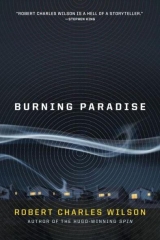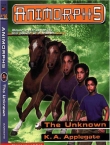
Текст книги "Burning Paradise"
Автор книги: Robert Charles Wilson
сообщить о нарушении
Текущая страница: 15 (всего у книги 20 страниц)
PART THREE
BURNING PARADISE
What is intelligence, exactly? Maybe that sounds like a simple question. We know—or think we know—what our own kind of intelligence is like. After all, we experience it on a daily basis.
But there are other kinds of intelligence. There is the intelligence of the hive—the complex behavior that arises from individually unintelligent organisms following a few simple behavioral rules in response to cues from the environment. And there is a kind of intelligence that inheres in the ecosystem as a whole.
Evolution, over time, has created entities as diverse as crinoids and mushrooms and harbor seals and howler monkeys, all without a predetermined goal and without devoting even a moment of thought to the subject. You might even conclude that this kind of thoughtless intelligence is more powerful and patient than our own. What are the limits to mindless intelligence? Or, and here’s an even more striking question, could mindless intelligence successfully mimic mindful intelligence? Could an entity (an organism, hive, ecosystem) learn to speak a human language, perhaps even deceive us into accepting it as one of our own and allowing it to exploit us for its own purposes?
Such an entity would lack real self-awareness. It would never experience the inner life we discussed in a previous chapter. But given an adequately broad sample of human behavior to mimic, it could almost certainly conceal those deficits from us.
Why would such an entity want to fool us? Perhaps it wouldn’t. But mimicry is one of the common strategies by which a species gains an advantage over its competitors. We may hope the question remains for ever hypothetical. But the possibility is real.
—Ethan Iverson, The Fisher man and the Spider
24
 ANTOFAGASTA
ANTOFAGASTA
LATER—AFTER STORIES HAD BEEN TOLD on both sides, mistaken assumptions corrected, difficult truths shared—Nerissa asked Cassie to help her put Thomas to bed.
“I can go to bed by myself,” Thomas said, but it was a token protest, and he seemed secretly relieved when Nerissa led him upstairs. She took him to the room she had shared with Ethan until he left, where she separated the single beds, one for Thomas, one for Cassie. Nerissa planned to spread a blanket on the carpet and sleep by the door, guard-dog style.
Cassie made no objection, though she seemed slightly miffed at the idea of being relegated to a room with her little brother. Nerissa had seen the looks that passed between her niece and Beck’s son Leo, and she could guess what might have happened during the journey from Buffalo to Antofagasta. That was dismaying but not surprising, and Nerissa withheld judgment. But it was hardly practical to allow Cassie and Leo to share a room…. and Werner Beck would have vetoed the idea.
Nerissa remembered Leo as a truculent adolescent with an unfortunate penchant for petty crime, but maybe he’d changed. Or maybe his truculence had been an understandable reaction to his status as his father’s son. The awkwardness between Beck and Leo suggested the latter. Still, she would have thought Beth Vance was more Leo’s type. But Beth had apparently been more attracted to Eugene Dowd, the semi-literate garage mechanic Beck had shanghaied as one of his “warriors.”
At least Dowd—unlike the rest of Beck’s supposed army—had actually shown up for the battle.
Thomas’s eyes closed and his breathing steadied almost as soon as his head hit the pillow. Nerissa tucked the blankets around him while Cassie stood at the window, looking past the wrought-iron balcony railing to the dusty back alley where a garbage truck groaned through the heat. “The next thing we need to do is get you and Thomas back to the States.”
Cassie closed the curtains. “Really? Is that even safe? After what happened with the man we killed—”
“The man Leo killed.” Nerissa had cringed when she heard this part of their story, but she hadn’t shied away from dealing with it. “There won’t be any legal problems. If it happened the way you said it did, there’s no substantial evidence to connect you or Thomas to the crime.”
“Except for the man who saw us… the man Beth hurt.”
“At best, the police might have a vague description. And even if, somehow, they did come after you, it wouldn’t be hard to put together an alibi. But you won’t need one.”
“If the sims find us it hardly matters about the police.”
That was unfortunately true. “But it’s not you they’re after. You’re in far more danger here than you would be back in Buffalo.”
“No.” Cassie shook her head. “You’re wrong. It was me they came for. The sim that got run over on Liberty Street was looking for me.”
“You don’t know that. It might have been coming for me, or it could have been a ruse, or a feint, or even a way of getting at Beck through you and Leo.”
“I saw it looking at me from the street. It knew I was there.”
She seemed unwilling to admit any other possibility, and the
discussion was making her agitated. “Okay, Cassie, but even so, all we can do is take care of each other the best we know how. You, me, Thomas—”
“And Uncle Ethan?”
“Maybe. He’s in—”
“I know. He’s in the desert, looking for a place for Leo’s father and his soldiers to meet up,” Cassie said. (All Beck’s imaginary soldiers, Nerissa thought.) “Are we going to wait for him to get back?”
“I’d like to. But we may not have time. We need to be on a plane out of here as soon as it can be arranged.”
“Why?”
“For one thing, we can’t keep on exposing Thomas to this kind of danger. It’s not right.”
“Leo’s staying.”
“I’m not responsible for Leo. What Leo does is between him and his father.”
It had been Beck’s idea to send Ethan to San Pedro de Atacama.
According to Beck the plan was simple: get a mobile radio source and signal generator within effective range of the Atacama facility, shut it down by interfering with its internal and external communications, and destroy the facility while its inhabitants were incapacitated. Beck claimed to have laboratory evidence that this scheme would work. His faith in it was messianic and, Nerissa suspected, gravely misplaced.
But Ethan considered the idea plausible, and at Beck’s suggestion he had agreed to travel to San Pedro de Atacama to scout out a place where a truck full of radio gear, a similar cargo of incendiary material, and Beck’s supposed fifty-man army could assemble for the attack.
He had been gone for two days now. Because it would have been suicidal to report by telephone, there was no way of knowing whether or not he had been successful. And because he had been away, he hadn’t seen the most recent evidence that Beck’s scheme was jury-rigged if not downright delusional.
The signal-generating device, which Beck had designed himself, had arrived in the back of Eugene Dowd’s van, but the amplification and broadcast gear Beck had ordered from Valparaiso hadn’t been delivered—hadn’t even been shipped, according to the freight service; the vendor had declared bankruptcy. Beck sulked for an afternoon, then told Nerissa he could make do with off-the-shelf equipment from another supplier… which would nevertheless have to be discreetly purchased and delivered, delaying the attack by at least a few days more.
And there was the question of his army. Fifty men, Beck had claimed. More like a platoon than an army. Fifty men good and true, recruited from three continents, to be housed in five safe houses scattered across Antofagasta. But at last report none of the alleged volunteers had succeeded in leaving their native countries. For replacements Beck had managed to recruit a dozen men from the pool of unemployed stevedores at the dockside union hall. These men believed they were being hired to transport liquor to an unlicensed ware house in San Pedro de Atacama, and while they would be useful for lifting and carrying duties, not even Beck envisioned them as combatants.
It didn’t matter, he insisted. As long as the radio gear and the incendiaries were delivered to the desert, a handful of men—even three or four—could successfully conduct the attack. If all went well.
That was the plan on which Ethan had wagered his life.
Downstairs, Nerissa found Beth Vance sitting by herself in the common room near the kitchen. Beth was still coming to terms with the news that her father was alive.
A single unarmed sim had approached John Vance on the day Cassie and Thomas fled Buffalo. They had seen a body being removed from the apartment building where Beth lived with her father, but that had been the remains of the sim, which John had elected to shoot rather than engage in conversation. John had since gone into hiding, Nerissa didn’t know where, but someone in Buffalo would be able to put him back in touch with Beth when they got home.
Beth looked up at Nerissa with an expression that was hard to decipher. “Were you with my father when he killed the sim?”
“We can talk about that tomorrow.”
“I’d rather talk about it now.”
“Okay,” Nerissa said. “If you like. The answer is no, I wasn’t there. I’d left for home by then.”
“But you spent the night?”
“Yes.”
“I knew about that. He told me he was seeing someone. He just didn’t say who.” She darted another glance at Nerissa, looked away. “It wasn’t the first time. He doesn’t usually see Society women, though. Most women he doesn’t see more than once. Actually, that’s why I was at Leo’s place. He didn’t care where I spent the weekend, as long as I was out of the house.”
“Maybe so. And maybe it was a mistake, my seeing him. But I’m sure he’s worried about you.”
“Not worried enough to come looking for me. Not the way you came after Cassie and Thomas.”
“That’s not a fair comparison. He doesn’t know anything about Werner Beck or Leo. Your father never paid attention to Correspondence Society business.”
Which, ironically, was one reason Nerissa had accepted John’s invitation to spend the night. Like John, she had been connected to the Society by marriage; like John, she harbored an abiding anger at the way the Society had disfigured their lives.
“Well, that’s true,” Beth said. “He doesn’t even like me going to survivor meetings. Probably we wouldn’t have had anything to do with the Society, except he needed the pension. It wasn’t much but it made a difference. Do you like my father?”
“We’re friends, but I don’t think it was going anywhere.”
“Not your type, huh?”
“Maybe we just weren’t the people we thought we were.”
“He can be a real shit. I’m not going back to him.”
“What?”
“Don’t look so shocked. I know him better than you do. I’ll go back to the States, but I’m not living with him again.”
“But why?”
“He never, you know, touched me or anything. But he likes to look. And he likes to say things.”
After a few wordless seconds Nerissa said, “I’m sorry.”
“It’s okay. People aren’t always what you think they are. But I guess you know that.”
Nerissa slept fitfully by the door of the bedroom, startled awake by every sound the house made in its negotiations with the cooling night. And when she did at last fall into a deeper sleep, she slept shamefully late. She needed to talk to Beck about arranging her flight to the United States—she was determined not to spend another night here; she would take the kids to a hotel if that was necessary—but by the time she was dressed and downstairs Beck and Leo had already left on some errand. They would be back—Cassie relayed this datum—before dinner.
Noon came. Beyond the windows, the air itself looked pale and hot. Beth brooded in the shady common room with an equally sullen Eugene Dowd. Cassie sat in the kitchen, watching Nerissa heat precooked empanadas from the store across the street.
Cassie wanted to talk about what the sim Winston Bayliss had said back at Ethan’s farm house: the idea that the hypercolony might have been infected by some competing entity. Was that possible? Maybe, Nerissa said. Beck had claimed there was some evidence for it. But the hypercolony, like the devil, was a proverbial liar. Nothing it said could be trusted.
“Still, if it’s true, it could help us.”
“I doubt it, Cassie. It would only make the sims less predictable.” And more dangerous, the way a wounded and cornered animal is dangerous. She thought again of Ethan, on this the third day of his sojourn in the desert.
Beck and Leo came back in the still heat of late afternoon. Beck walked through the door with his shoulders squared and his head at a cocky angle, obviously pleased with himself. “We secured a small truckload of incendiary material,” he told Dowd. “We can move as soon as the radio gear is in place.”
Nerissa was mildly surprised. No other part of Beck’s plan had fallen into place so easily. But maybe it wasn’t terribly difficult to buy black-market explosives in a town that catered to the needs of a vast mineral-extraction industry.
Leo’s expression was the opposite of his father’s, a grim disdain. “Show them what else you bought,” he said tonelessly.
Beck gave his son a hostile stare, then opened the bag he was carrying in his right hand.
Inside the bag was an unmarked white plastic box. He put the box on the kitchen table and pried it open. Embedded in a sculpted foam protector was a graduated glass syringe and a dozen needles in sterile paper sleeves.
“Let me explain,” Beck said.
25
 SAN PEDRO DE ATACAMA
SAN PEDRO DE ATACAMA
ETHAN CAME INTO SAN PEDRO DE Atacama at dawn, switching off the car’s heater as the sun cleared the horizon. He felt tired and light-headed, probably because of the altitude. The Atacama plateau was almost eight thousand feet above sea level. Perilously close to the stars.
And perilously close to other things. The Chilean government discouraged tourism in the Atacama, and according to Beck commercial air routes were designed to avoid this part of the desert. (Arrangements that had been made, he supposed, using the hypercolony’s standard tool kit: telephone calls and radio messages subtly and imperceptibly altered or redirected, apparently minor decisions cascading toward a calculated outcome, no single intervention so overt as to create suspicion or leave an obvious fingerprint….) The only real industry anywhere nearby was the Chuquicomata copper mine to the northwest. The railhead and ware house complexes on the outskirts of town mainly serviced the Chuquicomata and a few smaller mines. The town itself was a pueblo with some fifteen hundred souls in permanent residence, and it was instantly obvious that Beck’s soldiers might be inconspicuous on the road but would be impossible to lodge here without attracting attention. The only hotel in town was a three-story adobe building, a dozen small rooms enclosing a central courtyard and a waterless concrete fountain. Checking in, Ethan told the counter clerk he had come to see the Valle de la Luna.
“¿Es usted un geólogo?”
“Soy un geólogo por cuenta propia,” he said, leaving the clerk to figure out what a self-employed geologist might be. He signed a false name to the register.
He slept longer than he meant to, dreaming of a passage in one of his own books about the Glyptapanteles wasp. The Glyptapanteles wasp lays its eggs in the bodies of geometrid caterpillars, and the freshly-hatched larvae feed on the living insect—typical parasitical behavior, with the nasty twist that if the larvae sense the approach of a possible predator they cause their host to thrash in agony. Thus the victim is forced to put on a puppet-show of aggression, defending its murderers even as they devour its flesh. In his dream Ethan took no part but watched without emotion as the drama cycled through iteration after iteration. It was only when he woke that he felt a flush of horror.
Misplaced horror, he told himself as he showered. His sympathy was an anthropomorphism, a projection. The caterpillar was hardly more than a protein engine enacting a suite of encoded behaviors. A meat robot. As am I, except that in the case of Ethan’s species evolution had conjured a knowing self out of chemistry and contingency. I feel, therefore I abhor.
Without meaning to he had wasted most of a day in bed, and he meant to make better use of the time that was left to him. As the afternoon light faded he drove through the town to its industrial perimeter, the ware houses and fueling stations, the train yard where cargo containers and propane tanks huddled like the abandoned yurts of nomadic giants. From the road where he idled his car he could see a gang of mechanics servicing a hulking yard switcher, laboring under halide lamps as bright as minor suns.
It was hard not to feel hopeless. The weight of what Beck wanted to do was enormous, and there were too many ways it could go wrong. It was impossible to know how many agents (human or sim) the hypercolony might have placed in San Pedro de Atacama, impossible to know how much of Beck’s plan the hypercolony had already discovered or inferred. But these doubts might only be part of what Ethan was beginning to recognize as a gathering bout of depression, the circling wolves of despair. He couldn’t help thinking about Nerissa: a long-closed door had opened between them, and he had let it fall shut again. For the sake of what? This mad act of human impudence?
He drove aimlessly, and he was many miles from town before he realized he was following the road Beck had described to him, the road that led to the hypercolony’s breeding ground. That would be fifty or more miles deeper into the desert, and Ethan had no intention of getting significantly closer. But the road was empty, the motion of the car comforting. A half-moon stood above the salt flats like a vigilant god. He was invulnerable in his unhappiness. He let the asphalt unspool a while longer.
He pulled over to the verge when he saw he’d added almost fifteen miles to the odometer. The air was cold and he switched on the heater, reminding himself again that he was riding the roof of the Puna de Atacama, only a thin skin of atmosphere between himself and the vacuum of space. He watched the horizon for the shaft of light Beck had described, but there was only the slow gyre of the stars.
He shivered and twisted the wheel to turn back. Traffic had been sparse, just a couple of box trucks and lowboys rumbling in the opposite direction, but a pair of headlights appeared in his mirror as he came off the gravel verge. Two unmarked white pickup trucks: the first, then the second, jockeyed abreast of him before passing at a furious speed. Ethan watched with relief as their taillights diminished in the distance.
They hadn’t come for him. But he was in a precarious place. He looked away from the road long enough to extract from the glove compartment the loaded pistol Beck had obtained and instructed him to carry. He put it on the empty seat beside him, not because he expected to use it but because it was reassuring to have it within easy reach.
He thought again of his dream, the Glyptapanteles larvae tweaking their host into a frenzied writhing. It was as good an analogy as any for what Winston Bayliss had claimed was happening now: the hypercolony, breeding its young in the nutrient warmth of human culture, had been attacked by a competing and equally alien predator. Both predator and prey were attempting to exploit human beings in their struggle. And if that was true, whose interests would Beck’s war serve? But to take the question seriously would mean abstaining from any action… a kind of induced paralysis, and maybe that was what the hypercolony hoped to achieve.
Something Nerissa used to say: We see through a glass, darkly. From the Bible. The New Testament, if Ethan recalled correctly. Corinthians? Nerissa would know.
In the dark glass of his rearview mirror Ethan saw more headlights coming up fast. He put a little extra pressure on the gas pedal, but the vehicles continued to close with him.
We see through a glass, darkly… Now I know in part, but then shall I know even as also I am known…. .There was something on the road ahead, obscured by the moon-shadow of an upright granite outcropping. He slowed until he could make out the obstacle, which he belatedly recognized as the two pickups that had passed him earlier, one in each lane of the highway, both now aimed in his direction, both stationary and dark. He swerved to pass on the verge when their high beams flashed on, blinding him. At which point it became impossible to do anything but stand on the brake or drive off the road.
He managed to stop. The pistol slid from the passenger-side seat to the floor. He was groping for it when a man tapped on his side window with the butt of a flashlight. “Dr. Iverson?”
Ethan’s fingers closed on the grip of the pistol. He straightened up. The man standing outside the car wore jeans, a ball cap, a work shirt, and a bland expression. His eyes glittered in the moonlight. Ethan shot him through the window of the car.
Safety glass exploded in a shower of fragments. By the time Ethan opened his eyes again the man—the sim—had dropped out of sight. But the odor of green matter mingled with the gunpowder stink of the fired weapon, making him think dazedly of chlorophyll, vinegar, bread mold, crushed leaves….
The headlights that had been following him belonged to two more identical pickups. They fishtailed to a stop behind Ethan, boxing him in before he could put the car in reverse. The only way he could move now was on foot. He fumbled through the side door and out, gasping at the thin air.
Another human shape swarmed toward him. Ethan faced it and fired. There was the wet sound of a bullet impacting flesh, but it failed to do critical damage. The sim took Ethan’s right arm above the wrist and twisted the gun out of his hand. Two more sims came out of the darkness and pinned him to the side of the car. He struggled uselessly, waiting for the killing shot.
But it didn’t happen. Yet another sim approached, this one in the shape of a slightly-built dark-skinned woman. It wore the same jeans-and-work-shirt outfit as the males, and its hair was tucked under an identical cap. It stepped fastidiously over the body of its colleague.
“Dr. Iverson, I apologize for what happened here. We don’t want to frighten you or hurt you. We want to talk to you.” The sim took a pair of handcuffs from its belt. “I apologize for this, too. Please put your hands behind your back.”








